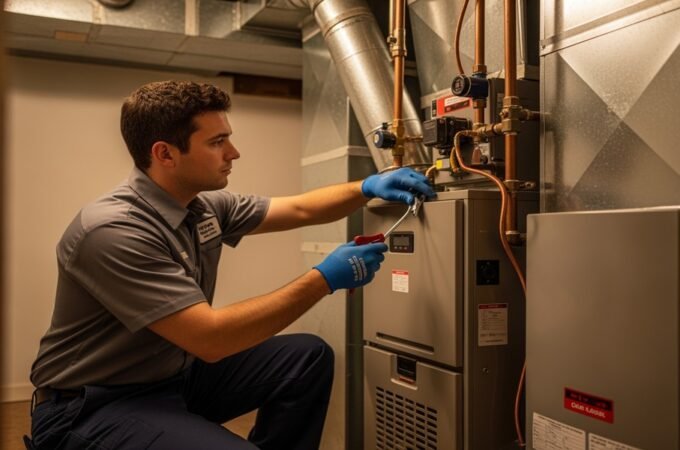Essential Home Systems Maintenance for Every Season
Table of Contents
ToggleThe Financial and Safety Benefits of Proactive Upkeep
Your home is more than just a place to live; it’s a significant financial asset and a sanctuary for your family. Just like any valuable investment, it requires consistent attention to maintain its worth and ensure its longevity. Proactive home systems maintenance isn’t just about fixing things when they break; it’s a strategic approach that yields substantial financial and safety benefits.

Infographic explaining the key benefits of home maintenance: increased resale value, lower utility bills, extended appliance lifespan, and fewer emergency repairs.
Preserve Your Home’s Value
One of the most compelling reasons for regular home maintenance is its direct impact on your property’s value. A well-maintained home signals care and quality to potential buyers, translating into a higher market price. Statistics show that regular maintenance can increase your home’s resale value by up to 10-15%. This includes everything from maintaining curb appeal through landscaping and painting to ensuring all major systems are in top working order. Addressing minor issues like chipping paint or damaged siding not only keeps your home looking its best but also prevents more significant structural problems down the line, safeguarding your investment.
Additionally, incorporating smart home storage solutions, such as shelving inserts, can improve organization, reduce clutter, and make your home feel more spacious, further boosting its appeal to prospective buyers. Addressing minor issues like chipping paint or damaged siding not only keeps your home looking its best but also prevents more significant structural problems down the line, safeguarding your investment.
Avoid Costly Emergency Repairs
Neglecting small issues is a common pitfall that can lead to expensive, unexpected repairs. A dripping faucet might seem minor, but it can waste thousands of gallons of water annually and contribute to mold growth or structural damage over time. Similarly, clogged gutters can cause water to back up, leading to roof damage, fascia rot, and even foundation issues. By addressing these small problems before they escalate, homeowners can save an average of 15-20% on repair costs. This proactive approach means less stress and more predictable expenses, avoiding the financial shock of a major system failure. The cost of a major plumbing repair, for instance, can range from $300 to $3,000 or more, while simple preventative maintenance is significantly less.
Improve Safety, Comfort, and Energy Efficiency
A well-maintained home is a safer, more comfortable, and more energy-efficient home. Regular checks ensure that critical safety devices like smoke and carbon monoxide detectors are functioning correctly, potentially reducing the risk of fatalities in a home fire by 50%. Addressing electrical hazards promptly prevents serious accidents.

When it comes to comfort and energy efficiency, your HVAC system plays a central role. Performing seasonal HVAC maintenance can improve energy efficiency by up to 25%, leading to lower utility bills. Tasks like replacing air filters, sealing drafts around windows and doors, and ensuring proper insulation prevent your heating and cooling systems from working overtime. Cleaning refrigerator coils, for example, can reduce energy consumption by 5-10% and extend the appliance’s lifespan. These simple steps contribute to a more consistent indoor temperature, reduced energy consumption, and a healthier living environment.
Regular maintenance also extends the lifespan of your home systems and appliances by up to 50%. This means you’ll replace expensive items like your HVAC unit, water heater, or major appliances less frequently, further contributing to long-term savings. Preventing frozen pipes, for example, can save homeowners hundreds of dollars in repair costs and water damage.
Your Year-Round Guide to Essential Home Systems Maintenance
Effective home maintenance isn’t a one-time event; it’s a continuous process that adapts to the changing seasons. By following a seasonal checklist, you can proactively prepare your home for varying weather conditions, prevent common issues, and ensure all systems operate efficiently year-round.

Spring: Refresh and Prepare
As winter thaws, spring is the perfect time to assess and address any damage from the colder months and prepare for warmer weather.
- HVAC System Service: Schedule a professional inspection and tune-up for your air conditioning unit. This ensures it’s ready for the summer heat, runs efficiently, and helps prevent unexpected breakdowns.
- Gutter and Downspout Cleaning:Clear out any accumulated leaves, twigs, and debris. This is crucial to prevent water from backing up and causing roof damage or foundation issues.
- Roof Inspection for Winter Damage:Visually inspect your roof for missing, cracked, or damaged shingles. Look for signs of wear around flashing and chimneys. Neglecting roof maintenance can lead to issues that cost thousands of dollars to repair, such as water damage and structural problems.
- Foundation Crack Check: Examine your home’s foundation for any new cracks or signs of shifting. Minor cracks can be sealed, but larger ones may indicate a more serious issue requiring professional attention.
- Window and Door Seal Inspection:Check weatherstripping and caulking around all windows and doors. Repair or replace any worn seals to improve energy efficiency and prevent drafts.
- Exterior Siding Wash: Clean your home’s siding to remove dirt, mold, and mildew. This not only improves curb appeal but also prevents long-term damage.
- Deck and Patio Safety Check: Inspect wooden decks and patios for loose boards, rot, or structural instability. Clean and reseal surfaces to protect them from moisture and UV damage.
Summer: Cool Down and Protect
Summer maintenance focuses on keeping your home cool, pest-free, and preventing water damage from summer storms.
- AC Filter Cleaning/Replacement:Replace or clean your HVAC air filters monthly. A clean filter ensures optimal airflow, improves indoor air quality, and reduces strain on your system.
- Ceiling Fan Direction Check: Ensure your ceiling fans are rotating counter-clockwise to create a cooling downdraft, helping to circulate air more effectively.
- Pest Control Inspection: Inspect your home’s exterior for any entry points for pests. Seal cracks and gaps, and address any signs of insect or rodent activity.
- Refrigerator Coil Cleaning: Vacuum or brush off dust and debris from the condenser coils at the back or bottom of your refrigerator. This improves efficiency and extends the appliance’s life.
- Plumbing Leak Checks: Regularly inspect visible pipes, under sinks, and around toilets for any signs of leaks. Address drips promptly to prevent water damage and mold growth.
- Professional HVAC Care: For optimal performance and to ensure your cooling system is running at its peak during the hottest months, consider scheduling routine maintenance with a specialist. For reliable and expert advice, specialists in Ohio Heating home systems maintenance can ensure your cooling system runs at its peak, keeping your home comfortable and efficient.

Fall: Winterize and Secure
As temperatures drop, fall maintenance is all about preparing your home for the colder months, preventing freezing, and ensuring heating systems are ready.
- Furnace Inspection: Schedule a professional inspection and tune-up for your furnace or heating system. This ensures it’s safe, efficient, and ready for winter.
- Chimney and Fireplace Cleaning: If you use a fireplace, have your chimney professionally inspected and cleaned by a CSIA-Certified chimney sweep annually, especially if you build a lot of fires in the winter. This prevents creosote buildup, a common cause of chimney fires.
- Pipe Insulation for Freeze Prevention:Insulate any exposed pipes in unheated areas like basements, crawl spaces, or garages to prevent them from freezing and bursting.
- Gutter Cleaning (Final): Perform a final thorough cleaning of gutters and downspouts before leaves fall completely and winter sets in.
- Weatherstripping Replacement:Inspect and replace any worn or damaged weatherstripping around doors and windows to prevent heat loss.
- Drain Outdoor Hoses and Faucets:Disconnect and drain all outdoor hoses. Turn off the water supply to outdoor faucets and drain them to prevent freezing.
- Sump Pump Testing: Test your sump pump to ensure it’s working correctly before heavy rains or melting snow.
Winter: Monitor and Maintain Indoors
Winter maintenance focuses on indoor comfort, safety, and monitoring for issues caused by cold weather.
- Monthly Smoke/CO Detector Testing:Regularly test your smoke and carbon monoxide detectors to ensure they are functioning. Replace batteries as needed, and replace units every 10 years.
- Checking for Drafts: Identify and seal any new drafts around windows, doors, and outlets to keep warm air in and cold air out.
- Monitoring for Ice Dams on Roof:Keep an eye on your roof for signs of ice dams, which can cause water to back up under shingles and lead to leaks.
- Basement Leak Checks: Inspect your basement or crawl space for any signs of water intrusion, especially after heavy snowmelt or rain.
- Cleaning Dryer Vents: Clean your dryer vent thoroughly to prevent lint buildup, which is a fire hazard and reduces dryer efficiency.
- Home Electrical System Maintenance: Winter often means increased electrical load with holiday lights and indoor heating. Regularly check for flickering lights, buzzing outlets, or circuit breakers tripping frequently. For comprehensive safety and performance, performing Home electrical system maintenance is crucial to prevent potential hazards.
Core Indoor and Outdoor Maintenance Systems
Beyond seasonal tasks, certain indoor and outdoor systems require ongoing attention to ensure your home’s structural integrity, functionality, and safety. These tasks can be a mix of DIY and professional services, depending on your skill level and the complexity of the job.

Key Indoor Home Systems Maintenance Tasks
Indoor maintenance is essential for comfort, air quality, and the longevity of your appliances and plumbing.
- Monthly Tasks:Test Safety Detectors:Test smoke and carbon monoxide detectors monthly.
- Clean Drains: Clear any debris from sink and shower drains to prevent clogs.
- Inspect for Leaks: Check under sinks, around toilets, and behind appliances for any signs of water leaks.
- Change HVAC Filters: Replace or clean HVAC filters every 1-3 months, or more frequently if you have pets or allergies.
- Water Heater Flush (Annually): Flush your water heater annually to remove sediment buildup. This improves efficiency and extends its lifespan.
- Appliance Cleaning (Quarterly):Clean major appliances like your oven, dishwasher, and washing machine regularly according to manufacturer guidelines. This includes cleaning refrigerator coils and dryer vents.
- Garbage Disposal Cleaning: Clean your garbage disposal regularly to prevent odors and ensure proper function. Use ice, baking soda, and vinegar.
Critical Outdoor Home Systems Maintenance Tasks
Outdoor maintenance protects your home from the elements and maintains its structural integrity and curb appeal.
- Roof Inspection (Bi-annually):Beyond seasonal checks, a thorough professional roof inspection every 3-5 years is recommended to catch subtle issues.
- Gutter Cleaning (Bi-annually): Clean gutters and downspouts at least twice a year, typically in spring and fall, but more often if you have many trees nearby.
- Siding and Paint Inspection (Annually): Inspect your home’s exterior for peeling paint, damaged siding, or signs of rot. Address these promptly to prevent moisture intrusion.
- Foundation Checks for Cracks (Bi-annually): Walk around your home’s exterior twice a year, looking for cracks in the foundation or signs of settling.
- Driveway and Walkway Repair: Repair cracks or uneven sections in driveways and walkways to prevent trip hazards and water pooling.
- Trimming Trees and Shrubs: Keep trees and shrubs trimmed away from your home’s roof and siding to prevent damage, blockages, and pest access.
When to DIY vs. When to Call a Professional
Knowing when to tackle a repair yourself and when to call in an expert is crucial for effective home maintenance. While DIY can save money, attempting complex repairs without the right skills or tools can lead to more costly damage or safety risks.

Simple DIY Home Repairs You Can Tackle
Many common home maintenance tasks are well within the capabilities of the average homeowner, requiring basic tools and a little guidance.
- Changing HVAC Filters: A straightforward task that significantly impacts air quality and system efficiency.
- Unclogging Drains with a Snake: For minor clogs, a simple plumbing snake can often clear the obstruction.
- Replacing Faucet Washers: A leaky faucet is often fixed by replacing a worn washer, saving water and preventing damage.
- Caulking Windows and Baseboards:Sealing gaps improves energy efficiency and prevents moisture intrusion.
- Tightening Loose Hardware: Screws on door hinges, cabinet handles, and light fixtures can loosen over time and are easy to tighten.
- Cleaning Appliance Coils: Regularly cleaning refrigerator coils and dryer vents is simple and improves efficiency and safety.
Homeowners can save an average of $500-$1,000 annually by performing basic DIY home maintenance tasks.
Signs You Need Professional Help
For more complex issues or when safety is a concern, it’s always best to call a professional. Recognizing these signs can prevent minor problems from becoming major disasters.
- Major Plumbing Leaks or Low Water Pressure: Persistent leaks, significant drops in water pressure, or strange noises from pipes often indicate deeper issues requiring a licensed plumber.
- Electrical Issues: Flickering lights, buzzing outlets, frequent circuit breaker trips, or the smell of burning plastic are serious electrical warnings. Do not attempt to fix these yourself; call a qualified electrician immediately.
- HVAC Making Strange Noises or Emitting Odors: Grinding, banging, squealing, or burning smells from your furnace or AC unit are signs of mechanical problems that need a professional HVAC technician. Signs your air conditioning needs repair include unusual noises or reduced cooling capacity.
- Significant Roof Damage or Missing Shingles: If you notice large areas of missing shingles, significant leaks, or structural damage to your roof, a professional roofer is essential.
- Large Foundation Cracks: While small hairline cracks are common, large, widening, or horizontal cracks in your foundation can indicate serious structural issues that require an expert.
- Persistent Pest Infestations: If DIY pest control methods aren’t working, or if you suspect termites or other wood-destroying insects, a professional exterminator is necessary.
Frequently Asked Questions about Home Maintenance
How can a home maintenance checklist help homeowners?
A home maintenance checklist is an invaluable tool for staying organized and proactive. It breaks down the often-overwhelming task of home upkeep into manageable monthly, quarterly, and seasonal tasks. By providing a clear roadmap, a checklist ensures that crucial maintenance items—from testing smoke detectors to cleaning gutters—aren’t overlooked. This systematic approach helps homeowners track completed tasks, anticipate future needs, and prioritize efforts, ultimately saving time, reducing stress, and preventing costly emergency repairs. It transforms maintenance from a reactive chore into a proactive strategy.
What are the biggest risks of neglecting home maintenance?
Neglecting home maintenance can lead to a cascade of costly problems and significant safety hazards. The risks include:
- Catastrophic Failures: Systems like HVAC, plumbing, and roofing are designed to last, but without maintenance, they can fail prematurely. This could mean a furnace breaking down in the dead of winter or a water heater bursting and flooding your home.
- Costly Repairs: Small, easily fixable issues, such as a leaky pipe or a few missing shingles, can quickly escalate into extensive water damage, mold growth, or structural compromise if ignored. The cost of a major plumbing repair can range from $300 to $3,000 or more, while simple preventative maintenance is significantly less.
- Reduced Lifespan of Systems:Regular maintenance can extend the lifespan of home systems and appliances by up to 50%. Neglect means you’ll be replacing expensive components much sooner than necessary.
- Safety Hazards: Unmaintained electrical systems can pose fire risks. Clogged dryer vents are a leading cause of house fires. Faulty smoke and carbon monoxide detectors can fail to alert residents to danger.
- Decreased Energy Efficiency: Dirty HVAC filters, unsealed windows, and poor insulation force systems to work harder, leading to higher utility bills and a less comfortable home.
- Loss of Home Value: A poorly maintained home will inevitably depreciate in value and be less appealing to potential buyers.
How often should major systems like HVAC and plumbing be professionally inspected?
For optimal performance, longevity, and safety, major home systems should be professionally inspected and maintained regularly:
- HVAC Systems: It is highly recommended to have your HVAC system (furnace and air conditioning unit) inspected and serviced twice a year. Schedule an AC tune-up in the spring before summer heat sets in, and a furnace tune-up in the fall before winter. This ensures efficiency, prevents unexpected breakdowns, and often validates manufacturer warranties.
- Plumbing Systems: While homeowners can perform visual checks for leaks regularly, a comprehensive professional plumbing inspection is advisable annually. This allows plumbers to check for hidden leaks, assess water pressure, inspect water heaters (including flushing them), and identify potential issues with drains and pipes before they become emergencies.
- Roof: A qualified roofer should inspect your roof every three to five years, or more frequently after severe weather events. This helps identify and address issues like damaged shingles, flashing problems, or potential leaks early on.
- Chimney: If you use a fireplace, a CSIA-Certified chimney sweep should inspect and clean your chimney annually to prevent dangerous creosote buildup and ensure proper ventilation.
Conclusion
Embracing a proactive approach to home systems maintenance is one of the smartest decisions you can make as a homeowner. It’s an ongoing investment that pays dividends in the form of a preserved property value, significant savings on costly emergency repairs, improved safety, improved comfort, and greater energy efficiency.
By following a seasonal maintenance schedule and understanding when to tackle tasks yourself versus when to call a professional, you gain peace of mind. A well-maintained home is not just a structure; it’s a safe, efficient, and comfortable haven for you and your family for years to come. Don’t wait for problems to arise; take charge of your home’s health today.






